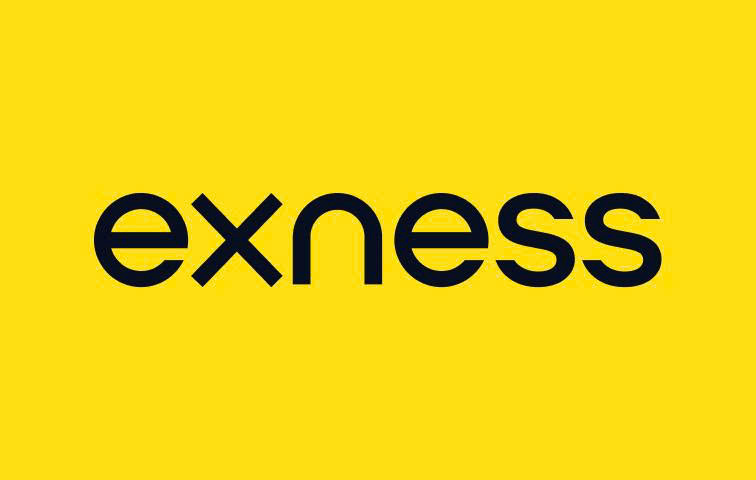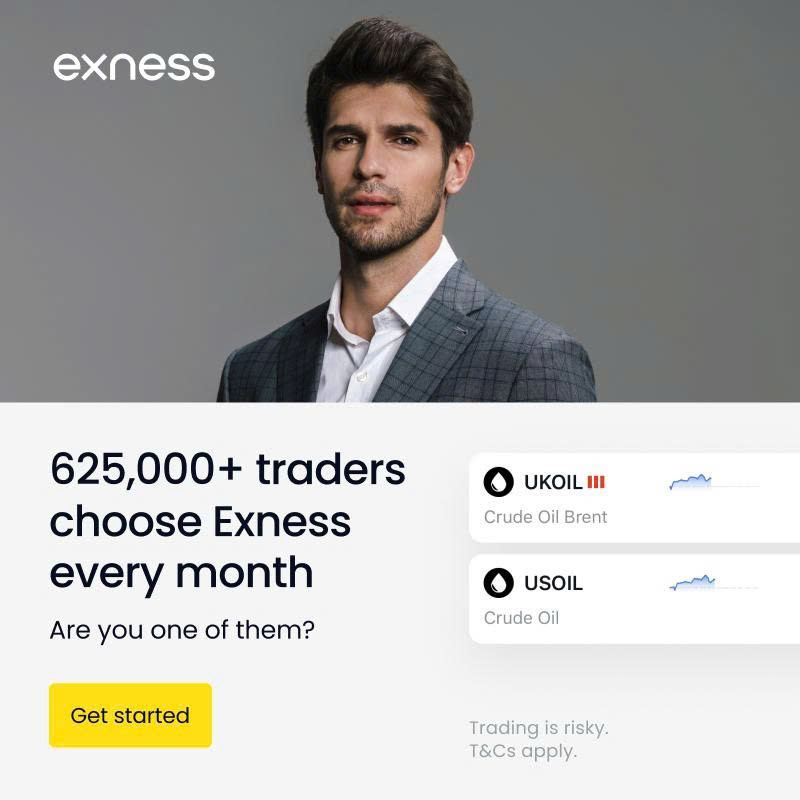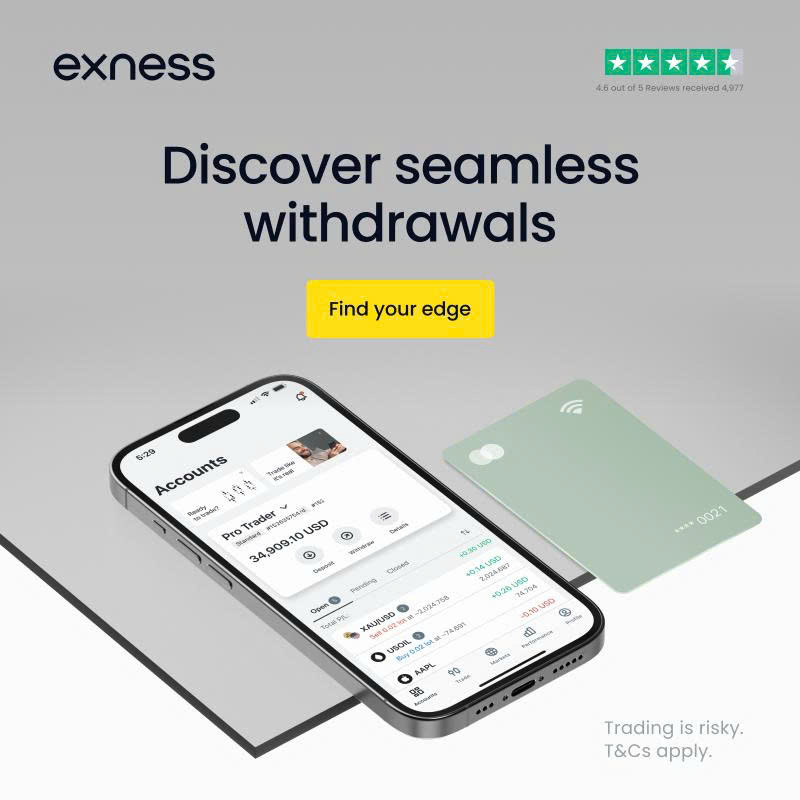
10 minute read
Does Exness Work in India? A Comprehensive Guide for Traders
from Exness
by Exness Blog
The forex trading landscape in India has grown exponentially, with platforms like Exness catching the eye of both novice and seasoned traders. But the critical question remains: Does Exness work in India? This article explores Exness’s functionality in India, its legal status, features, benefits, and practical steps for Indian traders to use the platform effectively. Whether you’re new to forex or an experienced investor, this guide offers clear, actionable insights to help you navigate Exness in the Indian market.

💥 Trade with Exness now: Open An Account or Visit Brokers 🏆
Understanding Exness: What Is It?
Exness is a globally recognized online trading platform established in 2008, specializing in forex, contracts for difference (CFDs), and other financial instruments. With over 2 million active users worldwide, Exness is celebrated for its low spreads, fast trade execution, and intuitive interface. Its global reach and reputation make it an attractive option for Indian traders, but how well does it align with India’s unique financial and regulatory environment?
Exness operates as an offshore broker, regulated by reputable authorities such as the Financial Services Authority (FSA) in Seychelles, the Cyprus Securities and Exchange Commission (CySEC), and the Financial Conduct Authority (FCA) in the UK. These regulations provide a layer of trust and security, but Indian traders must consider local laws to determine if Exness is a suitable choice for them.
Why Exness Appeals to Indian Traders
India’s forex trading scene is thriving, fueled by increased internet access, growing financial literacy, and a burgeoning middle class eager to explore investment opportunities. Exness stands out for several reasons that resonate with Indian traders:
· Competitive Spreads: Exness offers some of the tightest spreads in the industry, starting at 0.0 p_simple_tableips on select accounts, reducing trading costs.
· Diverse Asset Classes: Traders can access forex pairs, commodities, indices, and cryptocurrencies, catering to varied investment preferences.
· Accessible Platforms: Exness supports MetaTrader 4 (MT4), MetaTrader 5 (MT5), and a proprietary mobile app, making it suitable for both beginners and advanced users.
· High Leverage Options: Leverage up to 1:2000 is available, though Indian traders must exercise caution due to regulatory constraints.
· Efficient Withdrawals: Exness is known for its quick and seamless withdrawal process, a key factor for Indian users seeking reliable fund access.
These features make Exness a compelling choice, but its compatibility with India’s regulatory framework is a critical consideration. Let’s dive into the legal aspects.
Is Exness Legal in India?
Forex trading in India is governed by the Foreign Exchange Management Act (FEMA), overseen by the Reserve Bank of India (RBI) and, for certain activities, the Securities and Exchange Board of India (SEBI). Understanding these regulations is essential to determine whether Exness is a viable platform for Indian traders.
India’s Forex Trading Regulations
In India, forex trading is permitted but comes with strict guidelines. The RBI allows trading in currency pairs involving the Indian Rupee (INR), such as USD/INR, EUR/INR, GBP/INR, and JPY/INR, through SEBI-regulated brokers or exchanges like the National Stock Exchange (NSE) or Bombay Stock Exchange (BSE). Trading in non-INR pairs (e.g., EUR/USD) or CFDs is not explicitly allowed through domestic brokers, creating a grey area for offshore platforms like Exness.
Under FEMA, Indian residents can engage in forex trading but must adhere to specific rules:
· Fund Transfers: Money used for trading must be transferred through RBI-approved channels, such as banks, and comply with the Liberalised Remittance Scheme (LRS), which allows individuals to remit up to $250,000 annually for permissible transactions.
· Tax Obligations: Profits from forex trading are considered taxable income and must be reported to the Income Tax Department under applicable tax slabs.
· Restrictions on Margin Trading: Margin trading in forex, beyond what SEBI-regulated brokers offer, is restricted.
Exness’s Legal Status for Indian Traders
Exness operates as an offshore broker without SEBI registration or a physical presence in India. While there’s no explicit ban on using offshore brokers, Indian traders must ensure compliance with FEMA and RBI regulations to avoid legal issues. The platform’s oversight by trusted regulators like CySEC and FCA adds credibility, but traders should consult financial advisors to ensure they meet all local requirements.
In short, Exness is accessible to Indian traders, but its use falls into a regulatory grey area. Traders must prioritize compliance to operate within India’s legal framework.

💥 Trade with Exness now: Open An Account or Visit Brokers 🏆
How to Get Started with Exness in India
For Indian traders interested in Exness, here’s a step-by-step guide to begin trading safely and effectively:
Step 1: Register an Account
To start, visit the official Exness website or download the Exness mobile app from the Google Play Store or Apple App Store. Click the “Register” button and provide your email, phone number, and personal details. Indian traders may need to verify their identity using documents like an Aadhaar card, PAN card, or passport, as part of Exness’s Know Your Customer (KYC) process.
Exness offers multiple account types, including Standard, Standard Cent, Pro, Raw Spread, and Zero accounts. Beginners may find the Standard account user-friendly due to its no-commission structure, while experienced traders might prefer the Raw Spread or Zero accounts for tighter spreads.
Step 2: Deposit Funds
Exness supports several payment methods tailored for Indian users, ensuring convenient and secure transactions:
· Bank Transfers: Use NEFT/RTGS or international wire transfers for deposits.
· UPI: A popular option in India, UPI enables fast and cost-effective deposits.
· E-Wallets: Platforms like Skrill and Neteller are available, though their accessibility may vary.
· Cryptocurrencies: Exness accepts Bitcoin and other cryptocurrencies, appealing to tech-savvy traders.
Ensure that deposits comply with RBI’s LRS limits. Most deposits are processed instantly or within a few hours, depending on the method.
Step 3: Begin Trading
Once your account is funded, choose your preferred trading platform—MT4, MT5, or the Exness app. Select from a wide range of instruments, including INR-based forex pairs, commodities, indices, or cryptocurrencies. Implement risk management strategies, such as stop-loss orders, to protect your capital, especially given India’s regulatory constraints on leverage.
Step 4: Withdraw Funds
Exness is renowned for its fast withdrawal process, often completing transactions within 24 hours. Indian traders can withdraw funds to their bank accounts or e-wallets, ensuring compliance with FEMA regulations. Keep records of transactions for tax reporting purposes.
Benefits of Using Exness for Indian Traders
Exness offers several advantages that make it a strong contender for Indian traders:
· Cost-Effective Trading: With spreads starting at 0.0 pips and no commissions on Standard accounts, Exness minimizes trading costs.
· Flexible Leverage: Leverage up to 1:2000 allows traders to amplify potential returns, though caution is advised to manage risks.
· Localized Support: Exness provides 24/7 customer support in multiple languages, including Hindi, via live chat, email, or phone.
· Educational Resources: The platform offers webinars, tutorials, and market analysis, helping beginners build their trading skills.
· Mobile Accessibility: The Exness app is highly rated for its intuitive design, ideal for traders who prefer managing trades on the go.
These features make Exness a versatile platform, but traders must also be aware of potential challenges.
Challenges and Risks for Indian Traders
While Exness is accessible, there are hurdles to consider:
· Regulatory Uncertainty: As an offshore broker, Exness lacks SEBI regulation, requiring traders to navigate India’s forex laws carefully.
· Currency Conversion Costs: Depositing or withdrawing in INR may incur conversion fees, which can affect profitability.
· High Leverage Risks: While high leverage can boost gains, it also amplifies losses, particularly for inexperienced traders.
· Tax Compliance: Forex trading profits must be reported as income, and non-compliance can lead to penalties.
To mitigate these risks, Indian traders should:
· Consult a financial advisor to ensure adherence to RBI and FEMA regulations.
· Use a demo account to practice trading strategies without risking real money.
· Implement risk management tools, such as stop-loss orders, to safeguard capital.
Exploring Exness Account Types
Exness offers a range of account types to suit different trading styles, making it adaptable for Indian users:
· Standard Account: Ideal for beginners, this account has no commission and spreads starting at 0.3 pips, offering simplicity and affordability.
· Standard Cent Account: Designed for micro-trading, it allows small investments using cent-based lots, perfect for those testing the waters.
· Pro Account: Suited for experienced traders, it provides instant execution and low spreads for efficient trading.
· Raw Spread Account: Offers near-zero spreads with a fixed commission, ideal for scalpers and high-frequency traders.
· Zero Account: Features zero spreads on major instruments with a commission, catering to advanced traders seeking precision.
Indian traders should select an account based on their experience and risk tolerance. The Standard or Standard Cent accounts are excellent starting points for newcomers.
How Exness Compares to Other Brokers
Exness competes with both SEBI-regulated and offshore brokers in India. SEBI-regulated brokers like Zerodha offer INR-based trading with clear regulatory compliance but are limited to exchange-based forex pairs. Offshore brokers like XM or FBS provide similar features to Exness, such as high leverage and diverse instruments, but Exness stands out for its ultra-low spreads and fast withdrawals.
For Indian traders, Exness’s advantages include its cost-effective structure and support for INR pairs, but SEBI-regulated brokers may be preferable for those prioritizing local compliance. Always weigh the pros and cons of offshore versus domestic brokers before deciding.
Practical Tips for Indian Traders Using Exness
To succeed with Exness, consider these tips tailored for Indian traders:
· Align with Search Intent: Indian traders often search for terms like “Is Exness legal in India?” or “Best forex brokers for Indians.” Define your trading goals—whether scalping, day trading, or long-term investing—to choose the right strategies.
· Leverage Analytical Tools: Use Exness’s market news, economic calendars, and technical analysis tools to make informed decisions.
· Practice with a Demo Account: Test strategies risk-free to build confidence before trading with real funds.
· Ensure Regulatory Compliance: Use RBI-approved payment methods and maintain records for tax reporting.
· Minimize Fees: Opt for cost-effective deposit/withdrawal methods like UPI to reduce currency conversion costs.
For further insights, explore forex trading for beginners or choosing the right forex broker articles to deepen your knowledge.
Frequently Asked Questions About Exness in India
Is Exness Safe for Indian Traders?
Exness is regulated by trusted authorities like CySEC and FCA, ensuring a high level of security. However, Indian traders must comply with local laws to use the platform safely.
Can I Trade INR-Based Pairs on Exness?
Yes, Exness supports INR pairs like USD/INR, making it relevant for Indian traders.
What Is the Minimum Deposit for Exness?
The minimum deposit varies by account type, starting as low as $1 for the Standard Cent account.
How Fast Are Withdrawals on Exness?
Withdrawals are typically processed within 24 hours, depending on the payment method.
Does Exness Support UPI for Indian Traders?
Yes, Exness supports UPI, offering a convenient and widely used payment option in India.
Conclusion: Does Exness Work in India?
Exness is a viable platform for Indian traders, offering low spreads, high leverage, diverse instruments, and user-friendly platforms like MT4, MT5, and its mobile app. However, its status as an offshore broker means Indian traders must navigate FEMA and RBI regulations carefully to ensure compliance. By choosing the right account type, using secure payment methods like UPI, and implementing risk management strategies, Indian traders can effectively use Exness to pursue their trading goals.
💥 Note: To enjoy the benefits of the partner code, such as trading fee rebates, you need to register with Exness through this link: Open An Account or Visit Brokers 🏆
Read more:

